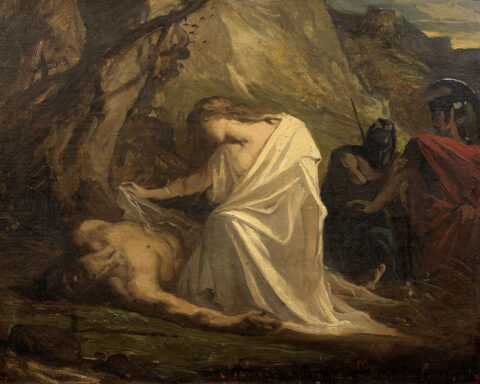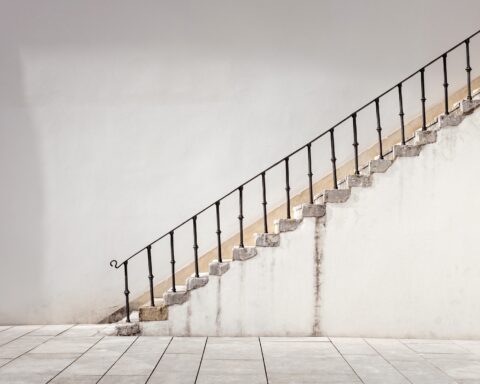Robert got me up before dawn to escape to the opulence of New Jersey. From our apartment at the corner of Manhattan Avenue and McCarren Park, we were only two hours from Long Beach Island, but Robert had this thing about traffic. If we got caught in it, at all, for any period of time, he raged and raged, often at me, which was never good or fun.
It seemed all our days were angry. Living together was a big commitment. We’d been fighting, as usual. So, we went to New Jersey on weekends, to the hotels on the shoreline, where we were kinder to each other, more understanding, even in love sometimes (with the right weather, under the proper conditions).
In Brooklyn, we had every reason to be happy. Although bustling, Manhattan Avenue’s noise was mostly vehicular. The people who lived there were older and went quietly about their errands, carrying bags of Frankel’s whitefish salad sandwiches, or ducking into Rite-Aid, (which used to be Greenpoint Roller Palace and still had the disco ball hanging from the vaulted ceiling). McCarren Park stood off invitingly, skipping with dogs, even at this hour.
We packed ourselves into Robert’s space gray Acura in abominable June outfits. He wore neon blue boardshorts and a pink Hawaiian shirt, a black fanny pack strapped across his left shoulder, containing sunscreen and cash, and 400-dollar sunglasses he compulsively cleaned with a microfiber cloth as he drove. I wore a long red sundress and Teva sandals, which he’d said were sensible, so I’d gone with them to avoid a fight.
I flipped down the car mirror to do my eyeliner while he entered Little Randy’s Pancake House into the car’s navigation system. We should have known the way by now. It was our favorite eggs and bacon place; all on our own, we could have kept the lights on.
When we got on the Garden State Parkway, my Grooving Back Into ’08 playlist was met with ruthless criticism and flat-out meanness, leading into a surprisingly political discussion regarding Akon’s questionable past. After pulling up an article entitled, “Akon: I want to sincerely apologize for dry humping that teen girl,” we landed on a mutual understanding: this was no R. Kelly; alas, it was the fault of the club. Akon was a victim of circumstance! What a relief.
When we hit traffic, I started to drink. I’d poured out half a bottle of diet ginger ale and filled it back up with vodka. It was 6am now.
“You had to blow-dry your hair,” said Robert.
“What?”
“We could’ve beat this,” he said, gesturing to the traffic.
“We couldn’t have beaten this,” I said. “It’s rush hour.”
“It’s not rush hour yet.”
“Yeah, it is,” I said.
“No, there was an accident up ahead. Look.”
“Same thing,” I said.
“If you didn’t blow-dry your hair, we could’ve been ahead of it.”
“Or we could have been in it.”
“Why would you say that?”
I went quiet and got back to my bottle. I had this college friend who quit drinking. She had entered into the program. The thing is that she wasn’t an alcoholic. That’s not something you’re supposed to say.
I wouldn’t have cared so much, probably, if she didn’t broadcast her sufferings and claim addiction as her own—and it wasn’t the only disease she claimed—she had been trying to say for years that she was Bipolar II, ADHD, Schizo, PTSD. She went to multiple doctors and psychotherapists trying land diagnoses and, again and again, failed. Alcoholism was the only one she could self-diagnose and get believed. She was trying to sound deep, problematic, bolster her otherwise nondescript identity. Myself being an alcoholic, it felt like she’d moved into my house and started calling my mother “mommy.”
Robert took offense to her, too, as he had been in the program going on eleven years. I brought her up to him often, as she was a subject on which we could always agree. Today, even this failed.
“I don’t get why you keep hanging out with her,” he said.
“All my friends left New York after graduation,” I said.
“Still,” he said, “she takes advantage of you. You hang around garbage, you start to stink! You hang around garbage, you start to stink!” Robert was laying on the horn. He took his microfiber cloth out of his fanny pack and rubbed his sunglasses.
I stared at his thick forearm, and wide, knobbed hands. He was stalky and blond, well-manicured to the point that my friends speculated homosexuality. Still, he was not traditionally handsome: freckles and skin tags, translucent lashes and brows. His looks bred immense insecurity, which buoyed his unkindness.
“Fucking morons!” Robert yelled at the road. He landed a fist on the steering wheel with surprising force.
“Practice your affirmations,” I said.
“They give a driver’s license to anybody!”
“Affirmations,” I said again.
Reluctantly, he mumbled, “I release my anger and choose peace. I am a happy person.”
We got off the Parkway and started in toward Beach Haven. The roadway was wide, and we caught every red light, which Robert didn’t seem to mind. As soon as we could smell the sea, he rolled down the windows and his mood shot up joyous; a Polish smile stretched his cheeks, and he grabbed my knee.
“We’re here!” he squealed and turned off the navigation system.
The cherry-red water tower loomed over the entire town; on the front, stamped in white, it read: WELCOME TO BEACH HAVEN. It was about 7am. I yawned repeatedly and had reached the end of my drink. We passed multiple surf shops, and expensive, gaudy boutiques; hung up in their windows were white, tasseled dresses, and circular straw bags. Locals strolled down the sidewalks with boogie boards, or coasted up to the red lights on vibrant, classic bikes. Morning existed here in rare and delighted way.
We passed the Long Beach Island Museum with its broad teak shake roof and two wind-beaten, red, white and blue flags, which read: OPEN. A woman dressed in all coral stood on the veranda, leaning on the balustrade. We passed the street that led to the marina, which was full of neighborly, white boats, bobbing, and lined with uniform Bar & Grills.
On the right, a shopping center we’d discovered the previous summer: year-round Christmas décor, beach fudge shaped into seashells and sharks, and costly local art—starchy, white mermaids and blurred, orange sunsets—all obscured in watercolor. We passed spas, tobacco shops, and realty offices with signs out front that said: SERVING MONMOUTH, OCEAN AND MIDDLESEX COUNTIES SINCE 1985!
We went by discount hotels, which were a long way from the water, but had misleading names like Seaview Resort, Gloria’s Oceanfront Motel, Sea Spray Lodge, etc. We stayed at The Seashell, which was right on the water with a private beach and swaying, imported palm trees.
Just a block down from the shore sprawled an amusement park with a Ferris Wheel, Drop Tower, and minigolf. Directly across from it: a waterpark with incredible slides, (closed for the summer), and themed plastic villages under chlorine rain (i.e., pirate ship, safari, bakery, castle).
There was, of course, the iconic colony of pastel houses in their respective shades of purple, blue, yellow, pink and green. They were crowded together so beautifully that I imagined, inside, the perfect innerworkings of an anthill.
We parked in one of the diagonal spots out front of Little Randy’s Pancake House and went inside. This early, there were only three other patrons in the whole place, seated together across the room: a large man, his wife, and a young woman, (presumably their grown daughter).
Dark brown breakfast tables sat humbly under wide, white ceiling tiles. On one wall was a collection of framed vintage photographs; on the other was a decal that read: LIFE’S A BEACH. On each table were dishes of sugar packets and pats of butter.
Robert and I sat in each other’s silence amidst the nostalgic 1950s-era music. The waitress brought us menus, which had pink, cartoon pigs printed on the front. A small pitcher of artificial maple syrup, (which Robert called “the real stuff”), sat sticky between us. We remembered the waitress from last time, but she didn’t remember us.
“Coffee this morning?” she asked.
“Just for her,” said Robert.
The waitress nodded and flipped my upside-down coffee cup over, filling it from the glass pot she carried like an accessory, an additional limb. I glanced over at Robert, who smiled down at his menu. When we fell in love in Brooklyn three years earlier, he used to stop me at every street corner just to kiss me obscenely. That was back before he lost forty pounds, and the unctuous juice of deluxe burgers dripped down the sides of our hands, and we found in each other what was supposed to be incredible strength. Not knowing how to talk to kids, he was constantly high fiving them. A slight speech impediment came Maypolling out of him, derived from the spaces in his teeth, and I had loved this. Now it irritated me.
“Thank you,” I said to the waitress.
“Are you from here?” asked Robert. I wanted to die. “We’re from Brooklyn.”
In a rasping Paterson accent she said, “I’ve been here my whole life.”
“You were our waitress last time,” he said.
“Ah,” she said. “My boyfriend lives in Brooklyn.”
“Oh, cool,” I said.
“He’s in a band called Pork Attention.” We nodded. “But me, I’m a beach girl. Me, I’m a beach girl.”
“We love this place,” said Robert.
“I’ll be back for your food order in a second, sweetie, okay?”
With voluminous, teased Italian hair and her dark, damaged tan, she walked back to the other table, as if in a mall, in her cadet blue Little Randy’s polo shirt.
“She didn’t remember us,” said Robert.
“A lot of people come in here.”
“We’re here all the time,” he said. “We’re always here.”
She was likely in her early thirties but appeared slightly older from sitting in the sun. She gave the effect of having gum in her mouth even though she didn’t. Her eye makeup was smoky, and her lipstick was pale pink—a 2010 trend that was still in fashion here. Next to her, the other patrons looked like chicken thighs.
I was drunk enough that no measure of silence was bothersome to me, nor any measure of noise. It wasn’t long before Robert was back on my case.
“I just don’t understand how you turned out to be a dirty New York skank. You had good parents, like, the best life possible. You didn’t need to do it. You had options. You didn’t need to do it,” said Robert.
“Can we not right now?” I said, as the waitress set our food down in front us.
Robert had ordered the South Bay Benedict: country biscuits with Lancaster ham and diced tomatoes, sausage gravy, and two eggs over medium. He peppered the dimpled whites, lanced both yolks with his fork, and their thick, sunshiny middles leaked down the ham and biscuits. I’d gotten the Shirley’s Favorite Omelet: grilled asparagus, wild mushroom, and goat cheese with a side of home fries.
“I’ll never get you,” he said. “Whole world in your hand and that’s what you do.”
“It was years ago,” I said.
“It wasn’t that long ago. You’re still young so it wasn’t that long ago.”
The Beach Haven mood hadn’t lasted, and he was angry again, bringing up the past, unprompted, over the steam of his benedict. Of course, he was referring to my stint as a nineteen-year-old stripper.
“Forget it,” he said. “Forget about yourself. How could you do that to your family? Or to me?”
“I didn’t know you,” I said.
“How could you do that to your family? You know, there are people who love you. I don’t know why, but they do.”
“Don’t be hurtful,” I said.
“Me hurtful?”
“I shouldn’t have ever told you that,” I said.
“Yeah, then you’d be a stripper and a liar. That’s much better, babe. Much better.”
“Do you need to do your affirmations?”
Then there was a huff followed by a shriek. We whipped around to see that the large man had heart attacked in front of his chocolate hazelnut pancake stack and side of bacon. He slid down in his chair, and his wife and the waitress worked together to move him to the floor, but couldn’t support his weight, and dropped him down on his back. They looked at each other with confusion and fear as if they’d accidentally pulled a shark up into their boat.
“Dad!” yelled the grown daughter.
The waitress said she knew CPR.
Now, I don’t know CPR, so I can’t be certain, but I’m pretty sure she was doing it wrong. It just didn’t look quite right, that’s all. Her hands perched on top of each other, pink acrylic nails clacking, thrusting on his chest like frantic sex; she wasn’t calm, which I think you’re supposed to be, so her own breath was laborious, and she funneled it into his mouth inappropriately.
His wife was hysterical. I could sympathize with her, sure, but just wasn’t a fan. She wore too much jewelry, objectively, and her wedding rings were inexcusable: a square diamond with a wide, gold band beneath it, cutting off her circulation. A turquoise statement necklace and matching earrings hung off her, making her the poster child for Ancient Egyptian mediocrity. She was well into her 60s; thick, strappy tan lines ran down her shoulders and cut above the neckline of her shirt, so I could see her tan neck turn to pale breast.
The waitress, on the other hand, was fantastic. She was way too confident in skills I’m not sure she possessed, like an eighteen-year-old sex partner. Her youthful rock-n-roll quality suggested she tolerated things like whiskey and anal. One look at her could have been what brought on the heart attack, or it could have been a sudden realization that he’d never leave his ordinary wife, and he’d live beside her indefinitely in their LBI beach house, buying her turquoise.
I looked at Robert like he should intervene. He had stopped eating, but that seemed to be all that changed. I looked toward the kitchen, where a young chef boy leaned over a counter, frozen.
“Call 911,” I said under my breath.
“He’s not having a heart attack,” said Robert.
“What are you talking about?”
“My uncle had one at my sister’s wedding. That’s not what it looks like.”
“My phone’s in the car,” I said. “Rob, call. Come on.”
“That’s not what a heart attack looks like,” he said. “I bet somebody already called.”
“Even if they did!”
“Please!” the wife yelled, not at us. “Stay with us!”
“Call!” I said to Robert.
He took his phone out of his fanny pack, rolling his eyes, and called 911. He held the phone between his ear and his shoulder, picked up his sunglasses and rubbed them with the microfiber cloth.
“There’s a guy dying at Little Randy’s Pancake House,” he said to the emergency dispatcher. “I don’t know,” he said; then to me, “she asked if he’s breathing.”
“Is he breathing?” I called out. At this point, we probably should have been standing. “Is he breathing?”
“I don’t think so!” called the waitress.
“Oh my god!” yelled the wife.
“Dad!”
“He’s not breathing,” Robert said into the phone. “Will you just send an ambulance? It’s Little Randy’s Pancake House.”
“On South Bay Avenue,” I whispered.
“I don’t think they need directions,” he said.
“Just say it,” I said.
“On South Bay Avenue.”
“Greg!” yelled the wife.
“Guy’s not doing himself any favors,” said Robert.
“Stop it,” I said.
“Just saying,” said Robert. “Coming here, look what he ordered.”
“What if they can hear you?”
“They’re not listening.”
“Please, God!” yelled the wife.
“That’s not what a heart attack looks like,” said Robert, again.
“How would you know?”
“My uncle at the wedding.”
They had to have been Italian, too. Most people around there were, or they had migrated from Florida or the Carolinas where they didn’t have Jersey’s turbulent weather, or stark, bugless Christmases when all the ice cream shops shuttered their windows, and Jerseyites tucked into diners to shelter from the cutting ocean wind.
The grown daughter had knocked over her cup of cloudy mystery juice, and it was dripping off the table and onto the carpet. She had big, fake boobs and was dark like her father. The alarm on her face had morphed to emotion, untimely patience, and bumbling inaction. It dawned on me that she was attractive, even beautiful, and I glanced over to see if Robert was checking her out; he was.
Now the wife had gotten down on the floor—which had been quite the process—first, grabbing onto the back of a chair and easing herself onto each knee, which didn’t appear to be a natural position for her, (poor guy), and she toppled over onto her hip. She sobbed over him while the waitress kept pumping her hands.
“Greg!”
Robert took two twenties out of his fanny pack and threw them on the table. He stood up to leave. I realized, this whole time, I’d been holding my breath.
“Shouldn’t we wait?” I asked.
“For what?” said Robert. “For him to die?”
“For the ambulance,” I said.
“They don’t need us,” said Robert.
What I can say about the large man and what he looked like on the floor: flushed purple-red, like he’d burned in the oven. The wife had undone his belt as if this would help, and what was left of his hair was sticking this way and that. All of his parts panicked, contributing to the disorder.
“Oh my God!” yelled the wife.
“It seems fucked up to leave,” I said, still sitting.
“Lost my appetite,” said Robert.
Not much of the man was visible once the wife got down on the floor, as she was blocking the view. I imagined his whole body expanding like Violet Beauregarde, buttons popping off his shirt.
“It’s fucked up to leave now!” I whispered sharply.
Robert bent, put hand on the table, leaned some weight into it, and got in my face.
“You don’t wanna see this guy die,” he said. “You don’t wanna see it.”
“You don’t wanna see it,” I said.
“You don’t wanna see it,” he said again, this time kinder.
I took away my eye contact and stood up, heading for the door as quickly and smoothly as I could, Robert ahead of me, hoping that right at that moment, nobody would be looking.
“Assholes!” the daughter yelled.
“Fuck you,” Robert said back.
The wife wept over the large man’s chest, which the waitress continued pounding with her hands. The coffee pot rested on the carpet beside them. The daughter got on the floor, too. All of them kneeling over him, useless, was touching in theory—their premature mourning, their state of distress.
An ambulance pulled up in front as we were leaving and two EMTs rushed inside. I thought one of them might be Angelina from Jersey Shore, as she worked as an EMT, an idea that Robert balked at, and said, “They filmed Jersey Shore in Seaside, not LBI, and she lives on Staten Island. None of them live on the shore except for The Situation. Grow up.”
“Jesus,” I said. “You know a lot about that.”
I thought we’d see the large man come out on a stretcher. We were in the car on the hot leather seats for a long minute before we left, but they didn’t come out.
Robert said we should go to the beach.
“Why don’t we go to our hotel?” I asked.
“Can’t check in until three,” he said.
“Are you kidding me?”
“I knew you wouldn’t want to enjoy this beautiful day,” he said. “You just want to sit in the room and drink.”
“I’m fucking exhausted,” I said.
“You’re a real psychopath, you know that? We just watched a guy die in there and you couldn’t give two shits.”
“He was dead?”
“Jesus Christ,” he said.
“You think he was dead?”
“Whatever it was, it wasn’t his heart,” said Robert.
“What was it then?”
“Aneurysm, maybe.”
“In his brain?”
“That’s not what a heart attack looks like.”
“You really think he was dead?” I asked again.
“She said he wasn’t breathing.”
“You’re the one who wanted to leave,” I said.
“Get over yourself.”
We parked in the lot outside The Seashell even though we couldn’t check in yet. Tourists were starting to rise and staggered out onto their concrete balconies, the cool breeze of morning touching their sunburns. We could hear children whine for the pool, which wouldn’t open for an hour, but they were already dressed in nylon swimsuits, climbing the architecture and eating Nutri-Grain Bars.
We drifted through the SUVs, hatchbacks and minivans to reach the wooden walkway that led down to the beach. We took off our sandals and they hung, in pairs, from our loose grip. The wind picked up as we started down toward the shore.
We reached the clear part of the sand, beyond the frail, wayward fence, which kept out gangly sprigs of eel-weed. The sand was delicate and warm. Couples milled by with pronounced slowness, like romance, (but not). Robert began his search for unique shells, which he never knew what to do with, so he gave them to me, (like romance).
Then there was the water. In front of us, its vastness sucked and poured. It laved the sand, drowning it, drawing it back. In its distant reflection were things as small as disappointment and as looming as grief. There was the water and the sound it made: a gigantic, alive reserve of rampage and amity.
Safely in the Garden State—which, most of the time, felt like it had no gardens—beauty toppled on itself, and reeling, confused, looked and smelled like Arcadia. An ocean had formed that even New Jersey couldn’t ruin.
In the evenings, white mole crabs in the hundreds would come up with the seaweed in the tide, darting in and out of tiny holes in the sand, so perfectly round that they would appear to have been drilled there. We would dodge their carapaces, imagining the size of their tunnels, each like an impossible birth.
I squinted upward, looking for kites. I could hear, faintly, The Seashell’s outdoor restaurant opening for breakfast. The sea gust whipped Robert’s Hawaiian shirt, creating a microcosmic storm on its palm tree design.
We stood under oystercatchers, terns, and black skimmers. Seagulls, wheezing, thronged and dispersed; they themselves turned over like waves, going gray to white to gray again. In flaps of angular wings, gray to white to gray, they cast shadows, overlapping and eclipsing each other. They made perfect, cloddish landings, chicken-pecking the sand, and went into gentle waddles, never settling.



